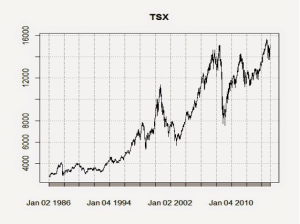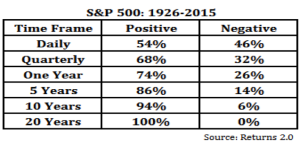Recording artist Daniel Powter was having a bad day – for much of the summer of 2006. At least that’s what his popular song called Bad Day told the world. Anyone who has invested in the stock market can sympathize because they, too, have probably seen their fair share of bad days.
The market’s gyrations give nearly everybody a case of emotional whiplash. One trick to succeeding as a long-term investor is to learn how to reduce the inevitable psychological swings that occur and avoid over reacting to changes in the price of your investments. Checking the value of your long term investments every day, or every week, or even every month is like planting a tree and then pulling it out of the ground to check to see how the roots are doing. It just isn’t very productive.
The accompanying graph shows the growth of the S&P/TSX composite index over the last 30 years. As you can see, the long-term has been highly favourable to Canadian stock investors and when you include the reinvestment in dividends, the overall return is quite respectable. Even the last couple of decades – which have seen a few significant bear markets – turned out okay for patient investors.

If the long-term returns from stocks have been good, why can it be so hard for investors to sleep tight? It comes down to psychology. Many studies in behavioural finance have shown that we feel the sting of losses about twice as strongly as we feel pleasure from gains. This quirk of the human mind is called loss aversion and was demonstrated by Amos Tversky and Daniel Kahneman, two of the pioneers of behavioural finance.
The emotional toll exacted by loss aversion can cause problems when you track every twitch of the market. After all, the chance that stocks will rise, or fall, on any given day is about equal. But since losses lower happiness much more than gains boost it, following the market’s day-to-day fluctuations becomes a recipe for depression. The chart below is one of my favourites as it shows the percentage of time U.S. investors earned positive returns. The numbers for Canadian markets are very similar and this chart is the key reason you cannot invest in the equity for short periods of time.

Matters become worse if your memory is good and you notice when your portfolio reaches new highs. While it can be fun to see your wealth climb to new peaks, portfolios often trade well below their former highs. This is amply demonstrated by looking at the peaks and valleys any longer term investor will experience along the way to success. Quite often equities are depressed when measured against their former highs since periods of consolidation typically follow very strong market performance.
This is easier to endure if you are mentally prepared for the overwhelming likelihood that, as a stock investor, your portfolio will see a great many bad days, even if your long-term results are good. Indeed, you’ll likely spend significant time with a portfolio that has declined from its prior peak.
Mental discomfort is the price you pay to obtain good returns. Unfortunately, few investors are actually prepared to pay that price in practice or understand what is required for success. If you were scared out of the markets near the lows of 2001 or 2009 then investing in stocks is probably not for you. (Think of the experience as an important – and likely expensive – lesson. And be sure to remember it.)
But even those with stronger stomachs should resist the urge to look at their portfolios too often. It’s a recipe for unhappiness that may prompt you to play Mr. Powter’s song far too often.
